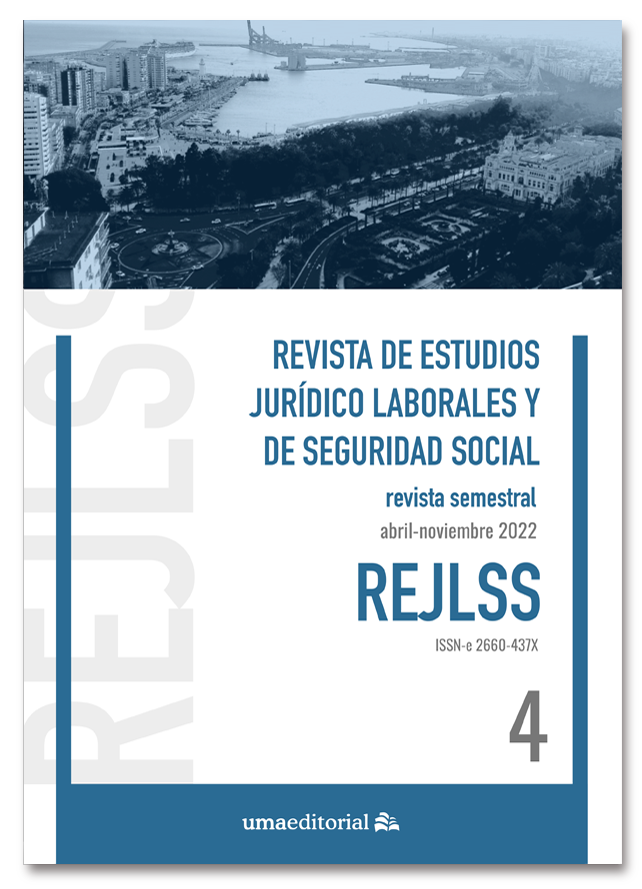A Look at Labor Reform
Lights and Shadows of Royal Decree-Law 32/2021
DOI:
https://doi.org/10.24310/rejlss.vi4.14282Keywords:
Labor Reform, Contracts, ERTEs, Collective Bargaining, Network MechanismAbstract
After the announcement of the agreement for the labor reform, the BOE publishes the new labor reform of 2022, an articulated text that aims to reduce precariousness and temporary employment and that has definitively entered into force within our legal system on February 4 of 2022. It involves a series of modifications that have a great impact in different areas of the labor market, such as changes in contractual modalities, new flexibility mechanisms and retaking the ultra-activity of collective agreements. Therefore, there are some aspects that deserve to be the object of reflection and synthesis of the well-known RDL 32/2021, of December 28, of urgent measures for labor reform, the guarantee of employment stability and the transformation of the labor market. The following document is, therefore, an approximation to the most notable aspects in terms of change in this long-awaited and debated Labor Reform, highlighting the new contractual modalities (determined duration, discontinuous fixed, indefinite contract attached to work, training), the nature of collective bargaining, ERTEs and the Red Mechanism, as well as some brief personal notes by way of conclusion.
Downloads
Metrics
References
De Val Tena, A.L., “La extinción del contrato de trabajo durante el periodo de prueba”, Revista de Estudios Jurídico Laborales y de Seguridad Social (REJLSS), núm. 2, 2021.
J&A Garrigues, S.L.P, “Novedades del Real Decreto-ley de medidas urgentes para la reforma laboral, la garantía de la estabilidad en el empleo y la transformación del mercado de trabajo”, Comentario: Laboral España, 2022.
SEPE, “El BOE publica las medidas urgentes para la reforma laboral, la garantía de la estabilidad en el empleo y la transformación del mercado de trabajo”, 2021.
Vila Tierno, F., “Unas mínimas reflexiones en materia de contratos y negociación colectiva en la reforma laboral 2021 (RDL 32/2021)”, Blog TRABAJO, PERSONA, DERECHO Y MERCADO. Nuevos retos del mercado laboral: Pobreza en el trabajo, economía colaborativa y envejecimiento, 2022.
Wolters Kluwer TAA España, “Reforma laboral 2021-2022: los puntos clave”, Wolters Kluwer, 2022.
Downloads
Published
How to Cite
Issue
Section
License
In the Revista de Estudios Juridico Laborales y de Seguridad Social (REJLSS) we are clearly committed to a policy of open access to scientific knowledge (See Berlin Declaration).
Those authors who have publications with this journal accept the following terms:
This journal provides immediate free access to its content under the principle of making research freely available to the public. All the contents published in the REJLSS are subject to the Creative Commons license
Attribution-NonCommercial-NoDerivatives 4.0 International (CC BY-NC-ND 4.0)
Copyrights are of two kinds: moral and patrimonial. Moral rights are perpetual, inalienable, non-transferable, inalienable, unattachable and imprescriptible prerogatives. In accordance with Spanish copyright legislation, the authors who publish in REJLSS retain the moral right over their work, as well as the ownership of the patrimonial right, which will be transferred to the University of Malaga for its dissemination in open access.
The patrimonial rights, refer to the benefits that are obtained by the use or disclosure of the works. REJLSS is published in open access and is exclusively authorized to perform or authorize by any means the use, distribution, dissemination, reproduction, adaptation, translation or transformation of the work.
It is the responsibility of the authors to obtain the necessary permissions of the images that are subject to copyright.
Authors whose contributions are accepted for publication in this journal retain the non-exclusive right to use their contributions for academic, research and educational purposes, including self-archiving or depositing in open access repositories of any kind.
The electronic edition of this magazine is edited by the Editorial of the University of Malaga (UmaEditorial), being necessary to cite the origin in any partial or total reproduction.
The authors may adopt other non-exclusive license agreements for the distribution of the version of the published work (eg: deposit it in an institutional telematic archive or publish it in a monographic volume) provided that the initial publication is indicated in this magazine.
Authors are allowed and recommended to disseminate their work through the Internet (eg, in institutional telematic archives or on their website) before and during the submission process, which can produce interesting exchanges and increase citations of the published work.






19.png)
